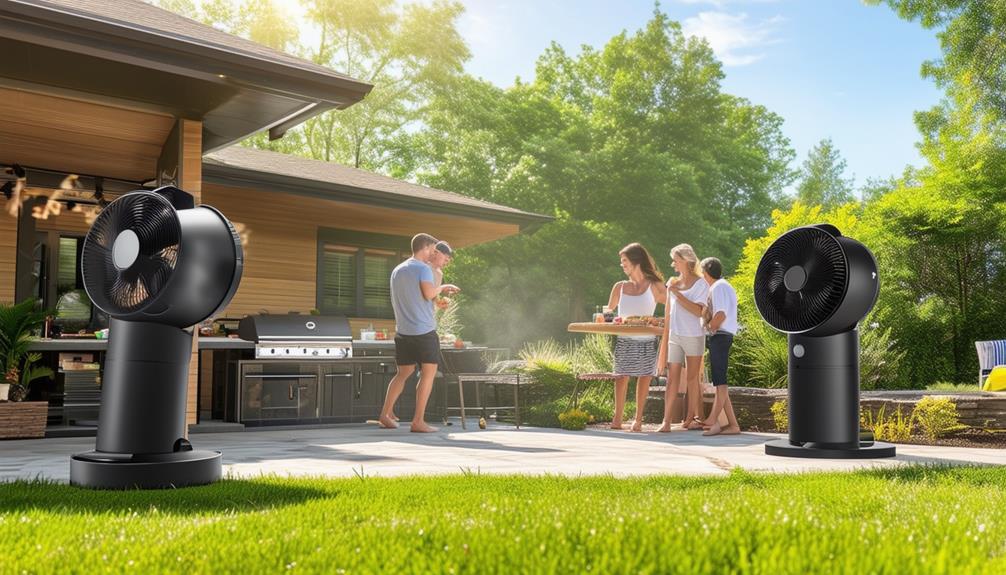Summer is a great time outdoors, but mosquitoes can make it less fun. To stop mosquito bites, try wearing long sleeves and light-colored pants. These clothes can help keep mosquitoes away. You can also use natural repellents like citronella candles, essential oils (like lavender or eucalyptus), and planting mosquito-repellent plants such as basil or marigolds around your yard.
Another way to stop mosquito bites is by getting rid of standing water where mosquitoes lay eggs. Check your yard for puddles and empty any containers with water. Putting screens on windows and using insecticide-treated bed nets can keep mosquitoes out of your house. Using fans outside can mess up their flight patterns, making it hard for them to land on you. Finally, plan your outdoor activities to avoid peak mosquito times in the early morning and evening. Use DEET-based repellents as a last resort for extra protection. Follow these tips to enjoy a mosquito-free summer!
- Wear long sleeves and tightly woven, light-colored fabric pants to minimize skin exposure and deter mosquitoes.
- Apply DEET-based repellents to block mosquito CO2 receptors and ensure prolonged protection.
- Regularly eliminate standing water to prevent mosquito breeding in your surroundings.
- Maintain clean gutters to avoid accumulation of water and disrupt mosquito breeding cycles.
- Utilize fans in outdoor seating areas to disrupt mosquito flight and reduce bites.
Wear Protective Clothing
Choosing long sleeves and pants made of tightly woven, light-colored fabrics can create an effective physical barrier against mosquito bites. This approach leverages the principles of protective clothing to lower the risk of mosquito-borne diseases to a noteworthy degree. Evidence suggests mosquitoes are attracted to dark colors; therefore, wearing light-colored fabrics can make one less appealing to these vectors. People can effectively minimize skin exposure by opting for tightly woven materials, reducing the number of exposed areas susceptible to bites.
Scientific studies underscore the efficacy of such clothing in thwarting mosquito bites during outdoor activities. The tightly woven nature of these fabrics impedes the mosquito’s proboscis from penetrating the clothing and reaching the skin. Covering as much skin as possible is a dual-function strategy: it offers a physical barrier and diminishes the chemical cues that attract these insects.
Use Effective Repellents
Utilizing effective repellents is a scientifically validated method for reducing mosquito bites and lowering the risk of mosquito-borne diseases. Among the various insect repellents available, those containing N, N-Diethyl-meta-toluamide (DEET) are highly endorsed by both the Centers for Disease Control and Prevention (CDC) and the Environmental Protection Agency (EPA). DEET blocks the mosquito’s CO2 receptors, effectively repelling mosquitoes and helping prevent mosquito-borne illnesses.
For best protection, consider the following guidelines when using DEET-based repellents:
- Choose the Right DEET Concentration: The efficacy and duration of protection provided by DEET-based repellents are directly proportional to their concentration. Higher concentrations offer extended protection. For example, a product with 30% DEET can protect for up to 6 hours.
- Apply Properly: Ensure thorough application to all exposed skin areas. This involves evenly spreading the repellent and avoiding eye and mouth contact. The proper application significantly enhances the product’s effectiveness.
- Reapply as Needed: The duration of protection varies with DEET concentration. Follow the manufacturer’s instructions for reapplication intervals to maintain effective mosquito bite prevention.
Following these guidelines ensures strong protection, fostering communal health and well-being in mosquito-prone environments.
Eliminate Standing Water

Eliminating standing water is an essential vector control strategy, as mosquitoes require stagnant water for their reproductive cycle. Regularly removing water sources, cleaning gutters, and ensuring containers are adequately sealed can significantly reduce mosquito breeding sites. Empirical evidence supports that these interventions substantially lower mosquito populations, thereby decreasing the incidence of mosquito-borne diseases.
Remove Water Sources
One of the most effective strategies to mitigate mosquito populations is the systematic removal of standing water, an essential breeding ground for mosquito larvae. Standing water provides a conducive environment for mosquito breeding, allowing larvae to develop into adult mosquitoes. Eliminating these water sources around your home is essential to prevent such breeding, helping keep mosquito populations under control.
Evidence-based practices suggest regular inspection and maintenance of potential water-holding containers can significantly reduce mosquito infestations. Here are three key actions to undertake:
- Empty and Clean Containers: Regularly empty and scrub items such as birdbaths, flower pots, and pet water dishes to remove mosquito eggs and larvae. This action disrupts the mosquito lifecycle and prevents their population from growing.
- Dispose of Unnecessary Items: Remove or properly store items that can collect rainwater, such as old tires, buckets, and tarps. By eliminating these water sources, you reduce potential mosquito breeding sites.
- Maintain Swimming Pools: Ensure that swimming pools are adequately chlorinated and covered when not used. Even small volumes of untreated water can serve as breeding grounds.
Clean Gutters Regularly
Regular gutter maintenance is essential to prevent the accumulation of standing water, which serves as a prime breeding ground for mosquitoes. Scientific evidence underscores that standing water in clogged gutters attracts mosquitoes, significantly increasing their breeding populations. This phenomenon can result in heightened mosquito infestations around residential areas, posing a substantial public health concern.
Cleaning gutters regularly disrupts this breeding cycle by eliminating standing water, depriving mosquitoes of the ideal environment for laying eggs. Detailed analysis indicates that consistent gutter maintenance can be a critical intervention to minimize mosquito habitats. By removing leaves, debris, and other obstructions, homeowners can ensure that water flows freely through the gutter system, thus preventing stagnation.
Furthermore, evidence-based practices highlight that well-maintained gutters can reduce the likelihood of mosquito bites and the transmission of vector-borne diseases. Regular gutter cleaning contributes to a healthier living environment and fosters a sense of community well-being. To summarize, clean gutters form a first line of defense against mosquito infestations, making them indispensable in any thorough mosquito control strategy.
Properly Seal Containers
Properly sealing containers to eliminate standing water is essential to disrupt mosquito breeding cycles and reduce vector-borne disease transmission. Mosquitoes depend on stagnant water for reproduction, laying their eggs in even small amounts of standing water. By effectively sealing containers and removing stagnant water sources, we can significantly help prevent mosquito reproduction and reduce their population.
Standing water can become a breeding ground within a week, providing an ideal environment for mosquito larvae. Hence, it is vital to inspect and address potential water accumulation sites regularly. Consider the following steps:
- Seal Containers: Ensure containers such as buckets, flower pots, and rain barrels are tightly sealed to prevent water collection.
- Regularly Empty: Dump out standing water from items like birdbaths and outdoor pet dishes every week to disrupt the mosquito life cycle.
- Maintain Proper Drainage: Ensure that water does not accumulate in gutters or other areas where it can become stagnant.
These simple steps make your environment less appealing to mosquitoes and contribute to a community effort to reduce the overall mosquito population. By acting together, we can keep mosquitoes at bay and protect our health and well-being.
Install Screens and Nets
Selecting appropriate screen materials and their proper installation are paramount to mitigate mosquito intrusion. Utilizing mesh screens with a fine weave can significantly impede mosquito entry while ensuring the screens are securely fitted to windows and doors enhances their efficacy. Additionally, bed nets, especially those treated with insecticides, offer crucial protection during sleep in high-risk regions, creating a complete barrier against mosquito bites.
Screen Material Options
Selecting screen materials with a mesh size of 18×14 or smaller is essential for effectively preventing mosquito entry. To achieve peak mosquito control, it is vital to consider the material composition and durability of the screens you choose to install. Screen material options such as fiberglass, aluminum, and stainless steel each offer unique advantages in terms of longevity and efficacy.
- Fiberglass: Widely used due to its flexibility and cost-effectiveness, fiberglass screens are resistant to rust and corrosion. However, they may be less durable compared to metal alternatives.
- Aluminum: Known for its strength and resistance to weathering, aluminum screens provide a robust barrier against mosquitoes. They are more durable than fiberglass but may be prone to denting.
- Stainless Steel: Offering superior durability and resistance to corrosion, stainless steel screens are ideal for high-traffic areas or regions with extreme weather conditions. Their long-lasting performance offsets their higher cost.
Moreover, it is crucial to ensure that screens have tight seals around windows and doors to prevent mosquito ingress. Regular maintenance and prompt repair of any tears or damages are essential to sustain the protective barrier. Thoughtfully selecting and installing appropriate screen materials can significantly enhance mosquito control and allow you to enjoy a more comfortable summertime environment.
Proper Installation Tips
Ensuring the effective installation of screens and nets is paramount for maximizing their efficacy in preventing mosquito ingress. Installing screens on all windows and doors is critical to mitigate mosquito bites. The mesh size should be smaller than an adult mosquito’s to preclude their entry into indoor spaces. This fundamental barrier method dramatically reduces the risk of bites by limiting mosquito access to exposed areas within homes.
Furthermore, insecticide-treated bed nets are recommended to safeguard individuals during sleep. These nets should be adequately secured around beds to ensure complete coverage and create an impenetrable physical barrier against mosquitoes. Regular inspections are imperative; examine screens and nets for any tears or holes, as these could compromise their protective capabilities. Prompt repair or replacement of damaged screens is essential to maintain their integrity.
Employedscreened enclosures and tents with mesh walls in outdoor settings can provide substantial protection. By meticulously installing these barriers around outdoor seating areas, one can create a mosquito-free zone, reducing the likelihood of bites. Adhering to these detailed installation and maintenance protocols ensures a fortified defense against mosquito bites, fostering a sense of communal safety and well-being.
Utilize Fans Outdoors

Positioning plug-in fans in outdoor areas creates airflow that disrupts mosquito flight patterns and effectively reduces their presence. By generating wind speeds above 1 MPH, fans can mimic natural breezes that are known to deter mosquitoes. This disruption is critical as mosquitoes struggle to navigate and land in such turbulent conditions. Additionally, the airflow produced by fans can disperse exhaled carbon dioxide, a key attractant for mosquitoes, rendering you less visible to these pests.
Scientific studies have demonstrated that utilizing fans in outdoor spaces provides physical relief and creates a less hospitable environment for mosquitoes. The combination of mechanical airflow and the dispersion of carbon dioxide significantly decreases the likelihood of mosquito bites. This method is simple and effective, making it an excellent choice for those seeking outdoor activities without mosquito presence.
To optimize the benefits of using fans outdoors, consider the following steps:
- Place fans strategically: Position them near seating areas and places where people congregate.
- Adjust fan speed: Ensure the airflow is strong enough to disrupt mosquito flight.
- Combine with other measures: Use fans alongside mosquito repellents for maximum protection.
Avoid Peak Mosquito Times
While enthusiasts can effectively reduce mosquito presence, another critical strategy is avoiding outdoor activities during peak mosquito times, typically at dusk and dawn. Due to ideal feeding conditions, scientific evidence indicates mosquitoes exhibit heightened activity during these twilight periods. In addition, mosquitoes are more active when wind speeds are low, as they are weak flyers. Hence, understanding and leveraging these behavioral patterns is essential for minimizing mosquito bites.
To effectively implement this strategy, one should plan outdoor activities during lower mosquito activity and choose locations with natural breezes. Natural airflow can deter mosquitoes by creating an unfavorable environment, reducing the likelihood of bites.
| Time of Day | Mosquito Activity Level | Recommended Action |
|---|---|---|
| Dawn | High | Avoid outdoor activities |
| Mid-Morning | Low | Safe for outdoor activities |
| Dusk | High | Avoid outdoor activities |
| Evening | Moderate | Choose locations with breezes |
Frequently Asked Questions
What Is the Best Thing to Use to Keep Mosquitoes From Biting You?
The most effective method to prevent mosquito bites is the application of DEET-based repellents. DEET’s proven efficacy, recommended by the CDC and EPA, provides long-lasting protection, ensuring safety and belonging in mosquito-prone environments.
What Stops You Getting Bitten by Mosquitoes?
Ironically, the best defense against mosquito bites is harnessing nature’s forces. Utilizing breezes, strategically positioning fans, and avoiding peak mosquito activity hours are scientifically proven methods to reduce the likelihood of bites drastically.
How Do Stop Mosquito Bites This Summer?
To mitigate mosquito bites during summer, employ EPA-approved repellents like DEET, wear light-colored attire, eliminate stagnant water, utilize fans to disrupt mosquito flight, and select breezy outdoor areas, especially avoiding peak mosquito activity periods.
What Smell Do Mosquitoes Hate?
The olfactory presence of citronella, lavender, eucalyptus, peppermint, garlic, lemongrass, basil, and rosemary repels mosquitoes. Empirical evidence suggests these scents disrupt mosquito sensory receptors, reducing their likelihood of targeting hematophagy in individuals.
Key Takeaways for Mosquito Bite Prevention
In summary, using a combination of methods to stop mosquito bites is like building a solid fortress. Wear protective clothing like long sleeves and light-colored pants to cover your skin and avoid mosquito bites. Lemon eucalyptus oil and other natural ingredients can be used as mosquito repellents. Keep your yard clean by removing standing water from places like bird baths to stop mosquitoes from laying eggs.
Set up mosquito nets and screens on windows and doors to keep mosquitoes out of your home. Use fans or air conditioning to lower body heat and make it harder for mosquitoes to fly. Avoid being outside during peak mosquito hours, like early morning and evening. If you need extra protection, use insect repellent sprays with DEET or other chemical repellents as a last resort, but follow the label instructions carefully.
Following these steps helps you enjoy the outdoors without the risk of itchy bites and mosquito-borne diseases like West Nile and yellow fever. Using a combination of methods creates a strong defense against mosquitoes. This approach reduces your attractiveness to mosquitoes and keeps you safe and healthy during the summer. Enjoy your time outside with confidence and comfort!





0 Comments